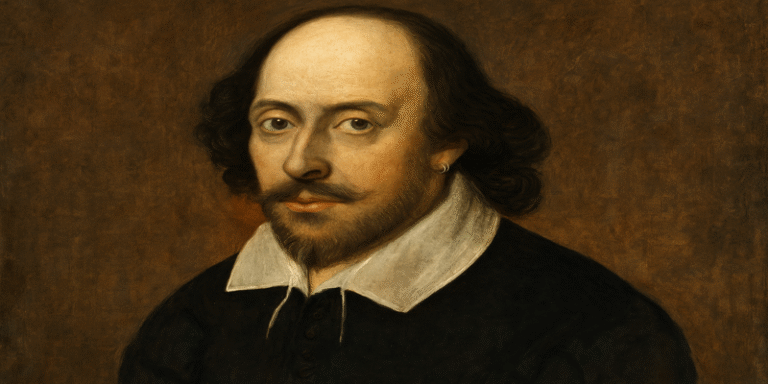William Shakespeare, often referred to as the greatest writer in the English language, continues to wield profound influence over literature and the development of modern English. Born in 1564 in Stratford-upon-Avon, England, Shakespeare authored 39 plays, 154 sonnets, and several narrative poems. His works are not only a cornerstone of Western literature but also a vital force in shaping the linguistic, thematic, and structural paradigms of English writing. This article explores Shakespeare’s enduring impact on the English language and literature, focusing on his linguistic creativity, thematic universality, and literary innovation.
Shakespeare and the Evolution of the English Language
Shakespeare’s contribution to the English language is arguably unmatched by any other writer. He is credited with coining or popularising over 1,700 words and numerous phrases still in use today. Words such as “assassination,” “bedroom,” “lonely,” and “majestic” first appeared in his works (Crystal, 2004). Shakespeare often modified existing words, invented neologisms, and used nouns as verbs and vice versa—a technique that added dynamism and depth to English expression.
According to David Crystal, a renowned linguist, Shakespeare had “an extraordinary capacity to exploit the resources of the language of his time” (Crystal, 2008, p. 29). His linguistic experimentation enriched the vocabulary of Early Modern English during a period of fluid linguistic change. In addition, Shakespeare’s penchant for rhetorical devices such as metaphor, pun, and irony not only made his dialogue more memorable but also influenced the stylistic choices of subsequent writers.
Phrases like “break the ice” (The Taming of the Shrew) and “wild-goose chase” (Romeo and Juliet) are embedded in everyday English. These idioms illustrate how Shakespeare shaped not just high literature but colloquial speech as well (McCrum et al., 2011).
Thematic Universality and Psychological Depth
Shakespeare’s exploration of human nature and social dynamics grants his works timeless relevance. His themes—love, power, jealousy, betrayal, ambition, identity—resonate across generations and cultures. This thematic universality has ensured the continual staging, study, and adaptation of his plays in diverse contexts.
For instance, Macbeth explores the destructive power of unchecked ambition and moral corruption, while Othello dissects jealousy and the tragic consequences of manipulation. These psychological insights prefigure modern understandings of human behaviour and emotion. Harold Bloom argues that Shakespeare “invented the human as we continue to know it” (Bloom, 1998, p. xvi), highlighting his role in shaping the psychological complexity seen in modern characterisation.
In literature, this psychological realism influenced novelists like James Joyce, Virginia Woolf, and William Faulkner, who sought to portray the inner workings of the human mind. Shakespeare’s soliloquies—such as Hamlet’s “To be, or not to be”—offered early templates for introspective narration (Greenblatt, 2010).
Literary Innovation and Structural Influence
Shakespeare revolutionised dramatic structure, blending genres and experimenting with narrative forms. His use of the five-act structure, which builds tension and climaxes before resolving, became a model for classical and modern drama. Moreover, Shakespeare often merged elements of comedy and tragedy, challenging the rigid genre distinctions of his time.
Tragicomedies like The Merchant of Venice and The Winter’s Tale exemplify this hybridisation. His structural versatility inspired later playwrights, including Henrik Ibsen, Bertolt Brecht, and Tom Stoppard. The flexibility of his plots and characters also allows for reinterpretation, a factor that contributes to the perennial revival of his plays.
Additionally, Shakespeare’s mastery of blank verse (unrhymed iambic pentameter) set a standard for English drama and poetry. His metrical innovations not only facilitated dramatic expression but also created a rhythmic quality that heightened the emotional and thematic impact of his texts (Furnivall, 2004).
Cultural Legacy and Modern Adaptations
Shakespeare’s cultural impact extends beyond literature into theatre, film, and even political discourse. His works have been adapted into countless languages and media, demonstrating their global resonance. Modern cinematic interpretations—from Baz Luhrmann’s Romeo + Juliet (1996) to Akira Kurosawa’s Throne of Blood (1957, based on Macbeth)—illustrate the adaptability and enduring appeal of his narratives.
Educational curricula around the world include Shakespeare’s works, not just for their literary merit, but for their insights into ethics, politics, and social dynamics. As the British Council (2023) notes, Shakespeare is “studied more widely than any other writer in the English-speaking world.”
Furthermore, his influence permeates political rhetoric and philosophical thought. Politicians and leaders often invoke Shakespearean phrases and archetypes to frame narratives and evoke emotion. For example, references to Julius Caesar and King Lear are common in discussions of political betrayal and leadership.
Criticism and Contemporary Relevance
While Shakespeare is lauded, he has also faced critique, especially regarding race, gender, and colonialism. Postcolonial and feminist scholars have scrutinised the representation of women and non-European characters in his works. For instance, The Tempest has been interpreted as a colonial allegory, and the character of Shylock in The Merchant of Venice has raised concerns about anti-Semitic stereotypes.
Nonetheless, these critiques often form part of a larger discourse that reaffirms Shakespeare’s relevance. By engaging with such issues, modern interpretations can recontextualise his works to reflect contemporary values and debates (Loomba, 2002).
William Shakespeare’s enduring influence on the English language and literature is vast and multifaceted. Through his innovative use of language, complex characterisation, and thematic depth, he has shaped the contours of English literary tradition and expanded the expressive capacity of the English language. His works continue to inspire writers, scholars, and audiences, serving as both a mirror of human experience and a canvas for artistic experimentation. Shakespeare not only reflected his world but also laid the groundwork for the evolving narratives of ours.
References
Bloom, H., 1998. Shakespeare: The Invention of the Human. New York: Riverhead Books.
British Council, 2023. Why is Shakespeare still so relevant today? [online] Available at: https://www.britishcouncil.org/school-resources/find/lesson-plans/shakespeare [Accessed 25 June 2025].
Crystal, D., 2004. The Stories of English. London: Penguin Books.
Crystal, D., 2008. Think on My Words: Exploring Shakespeare’s Language. Cambridge: Cambridge University Press.
Furnivall, F.J., 2004. Leopold Shakespeare: The Poet’s Works in Chronological Order from the Text of Professor Delius. London: Routledge.
Greenblatt, S., 2010. Will in the World: How Shakespeare Became Shakespeare. New York: W.W. Norton.
Loomba, A., 2002. Shakespeare, Race, and Colonialism. Oxford: Oxford University Press.
McCrum, R., Cran, W. and MacNeil, R., 2011. The Story of English. London: Penguin Books.









